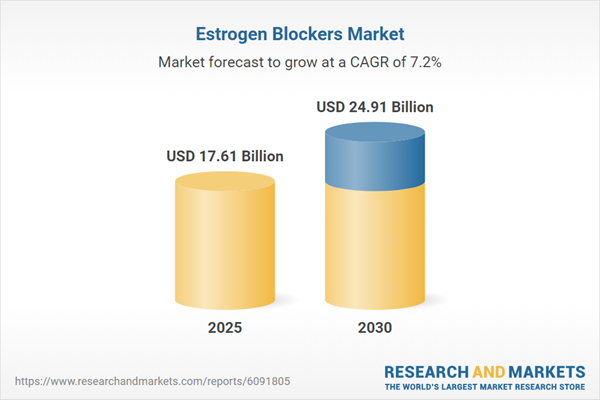Estrogen blockers also known as antiestrogens or estrogen antagonists, are a class of drugs prevent estrogens. The estrogen blockers market is driven and developed by the rising number of breast cancer cases, growing ovulation induction in infertility, and other hormonal disorders. The development of novel anti-estrogen therapies could expand the treatment paradigm for inhibitor-based therapies for patients with estrogen receptor (ER). Further, the leading factor propelling the market is the use of estrogen blockers in ovulation induction, such as Letrozole, an aromatase inhibitor that blocks estrogen synthesis. This has been used in a wide range of infertility treatments. Further, clomiphene citrate is prescribed with intrauterine insemination (IUI) for unexplained infertility.
Market Trends:
- Rising Breast Cancer Incidence Drives Estrogen Blocker Use: The increasing prevalence of breast cancer is a primary factor boosting the demand for estrogen blockers in medicine. GLOBOCAN reports breast cancer as the second most common cancer globally, after lung cancer, with approximately 2.3 million new cases in 2022, accounting for nearly 1 in 4 cancer diagnoses. That year, it caused around 666,000 deaths, making it the fourth-leading cause of cancer mortality worldwide. In the U.S., projections for 2024 estimate over 310,000 new cases, positioning breast cancer as the second-leading cause of cancer death among women in the country.
- Geographic Market Segmentation: The estrogen blockers market is divided into North America, South America, Europe, the Middle East and Africa, and Asia Pacific. Within Asia Pacific, major economies like China, Japan, India, and South Korea lead the market, alongside rapidly growing emerging economies such as those in the ASEAN region.
- Asia Pacific’s Market Growth: The Asia Pacific region is poised for significant expansion in the estrogen blockers market. The World Health Organization (WHO) notes that India recorded the highest number of breast cancer cases in the region, with 192,020 new diagnoses. This growth is supported by an aging population, rising disposable incomes, and expanding healthcare infrastructure across the region.
Key Benefits of this Report:
- Insightful Analysis: Gain detailed market insights covering major as well as emerging geographical regions, focusing on customer segments, government policies and socio-economic factors, consumer preferences, industry verticals, and other sub-segments.
- Competitive Landscape: Understand the strategic maneuvers employed by key players globally understand possible market penetration with the correct strategy.
- Market Drivers & Future Trends: Explore the dynamic factors and pivotal market trends and how they will shape future market developments.
- Actionable Recommendations: Utilize the insights exercise strategic decisions uncover new business streams and revenues in a dynamic environment.
- Caters a Wide Audience: Beneficial and cost-effective for startups, research institutions, consultants, SMEs, and large enterprises.
What businesses use our reports for?
Industry and Market Insights, Opportunity Assessment, Product Demand Forecasting, Market Entry Strategy, Geographical Expansion, Capital Investment Decisions, Regulatory Framework & Implications, New Product Development, Competitive IntelligenceReport Coverage:
- Historical data from 2022 t2024 & forecast data from 2025 t2030
- Growth Opportunities, Challenges, Supply Chain Outlook, Regulatory Framework, and Trend Analysis
- Competitive Positioning, Strategies, and Market Share Analysis
- Revenue Growth and Forecast Assessment of segments and regions including countries
- Company Profiling (Strategies, Products, Financial Information, and Key Developments among others)
Estrogen blockers market is analyzed in the following segments:
By Product Type
- Selective estrogen receptor modulators (SERMs)
- Selective estrogen receptor degrader (SERD)
- Aromatase Inhibitors
- Others
By Application
- Breast Cancer
- Hormone Replacement Therapy
- Ovulation Induction (Infertility)
- Others
By Distribution Channel
- Hospital
- Retail Pharmacies
- Others
By Geography
- North America
- USA
- Canada
- Mexico
- South America
- Brazil
- Argentina
- Rest of South America
- Europe
- United Kingdom
- Germany
- France
- Italy
- Spain
- Rest of Europe
- Middle East and Africa
- Saudi Arabia
- UAE
- Rest of the Middle East and Africa
- Asia Pacific
- China
- India
- Japan
- South Korea
- Taiwan
- Thailand
- Indonesia
- Rest of Asia-Pacific
Table of Contents
Companies Mentioned
- Pfizer Inc
- F. Hoffmann-La Roche AG
- Merck & Co. Inc
- Novartis AG
- Sanofi S.A,
- Eli Lilly and Company
- Hikma Pharmaceuticals PLC
- Lupin Limited
- Alembic Pharmaceuticals Limited
- Olema Pharmaceuticals Inc
- Fresenius Kabi
Table Information
| Report Attribute | Details |
|---|---|
| No. of Pages | 140 |
| Published | April 2025 |
| Forecast Period | 2025 - 2030 |
| Estimated Market Value ( USD | $ 17.61 Billion |
| Forecasted Market Value ( USD | $ 24.91 Billion |
| Compound Annual Growth Rate | 7.1% |
| Regions Covered | Global |
| No. of Companies Mentioned | 11 |









